
![]()
~ THE BUFFS ~
1572 - 1600
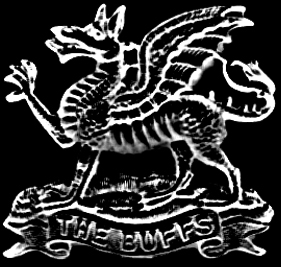
THE HOLLAND REGIMENT, FIRST FORMED 1572
The Buffs, one of the oldest regiments in the Army dating to 1572
Motto "Veteri Frondescit Honore"....."With its Ancient Honour it is Evergreen"
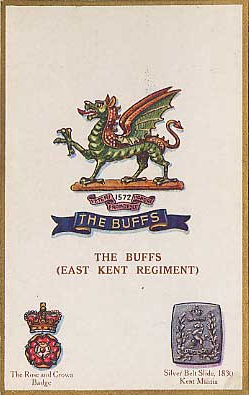
The Holland Regiment
3rd Regiment of Foot
Prince George of Denmark's Regiment
Argyle's Regiment
The Buffs
East Kent Regiment
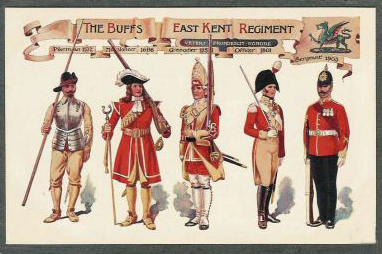
In 1665 the last Englishmen of those who served successively in Holland from 1572 returned home and became The Holland Regiment. In 1689 the title changed to Prince George of Denmark's Regt. also known as the 3rd Foot, THE BUFFS.
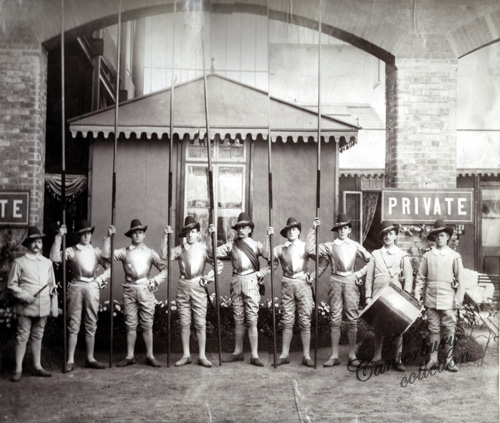
Uniform type c. 1572 (Pikemen)
The Buffs, an old photograph in my collection c. 1890's early 1900's
"From this date 1572, until 1653 the regiment was in constant active service, chiefly against the Spaniards in the Low Countries."
In 1665 the last Englishmen of those who served successively in Holland from 1572 returned home and became The Holland Regiment. In 1689 the title changed to Prince George of Denmark's Regt. also known as the 3rd Foot, THE BUFFS.
This regiment was put on the regular establishment of the army in the year 1665, the fifth after the restoration of King Charles the Second, the command of which was given to George R. Sidney, who held it for three years, when he died, and was succeeded in it by Sir Walter Vane. It was denominated the Buffs, from being the first whose accoutrements, such as sword-belts, pouch covers, or flaps, &c. were made of leather prepared from the buffalo, after the manner of shamois. The waistcoats, breeches, and facings of the coat, were afterwards directed to be made of a correspondent colour. When other regiments assumed this part of their appointments of the same, the regiment acquired the name of Old Buffs. This regiment has the privilege (and we believe exclusively) of marching through the city of London by beat of drum. We cannot learn, however, whence, or on what occasion, it was derived; probably for having been selected or distinguished for defending the city from some danger in a riot, fire, &c. or from having been originally raised within its precincts. It has, indeed, been vaguely reported, that the 3d regiment was at first composed of men who had belonged to the city. The Buffs have often been remarked for the posts of danger they have been in, and for acts of bravery they have achieved, especially under their commanders the Duke of Argyle and General G. Howard. ..... 1811
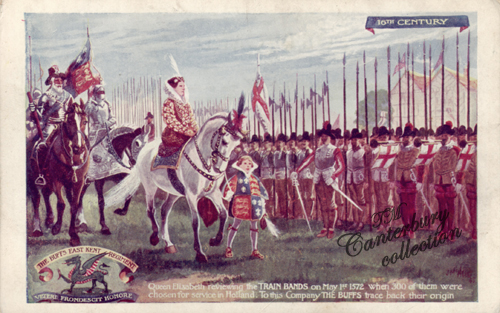
A postcard from my collection c. 1906 "Queen Elizabeth reviewing the TRAIN BANDS on May 1st, 1572 when 300 of them were chosen for service in Holland. To this Company THE BUFFS trace back their origin.
"The Buffs"
If ....will be good enough to take the trouble to look at the account of this regiment which I have given ... he will extract from Major Donkin's Military Collections, where it is stated, "The 3rd Regiment of Foot have the privilege of marching through London with drums beating and colours flying." I agree with .... that "the link between Morgan's corps and the Holland Regiment is missing." During Elizabeth's reign and subsequently the Low Countries was considered the school of arms where "soldiers of fortune" ie. no fortune could readily find employment. Thus we read that in 1573:
"many military men, having little to do at home, go em into the Netherlands... the first of whom was Thomas Morgan, who carried 300 English to Flushing; then followed by his procurement nine companies more under the conduct of Humphrey Gilbert."
These volunteers went with the sanction of Cecil, but not entirely with that of the Queen. This disproves the statement that these men were raised from the City of London companies and mustered in the presence of her Majesty:
"Out of England at this time there went into the Low Countries Lord North's eldest son, John Norris, son to the Lord Norris, Henry Cavendish and Thomas Morgan, colonels, with many volunteers, to learn military experience."
The Queen being of prudent and parsimonious habits, was not unwilling to despatch troops in aid of a policy, provided they were not maintained at her charge; thus she offered 5,000 men to Henry IV. of France, to be paid by him as soon as they were raised.
The Queen had a difficult part to play between the antagonistic powers of France and Spain, and it was not until 1585 that she consented to undertake the protection of the Low Countries, and to supply 5,000 foot and 1,000 horse, on condition of their expenses being repaid, and that Flushing and other places should be delivered over to her as a pledge. The terms were accepted, and the contingent was provided. The men were doubtless "pressed men." "Henry VIII. and Elizabeth," says Hallam
"sometimes compelled the counties to
furnish soldiers, and the perogative of pressing men for miltary service
even out of the kingdom, became as much established as undisputed."
It is even recorded that, a body of 1,000 men being suddenly required, the Lord Mayor on Sunday, when the churches were filled, closed the doors and made selections of the men. These men continued under the orders and the pay of the States, and officers were sent over here and allowed to recruit their companies. Matters thus remained till 1665, when, war being declared against the Dutch, Charles II. demanded the return of his native born subjects, who were then absorbed in one English regiment. The demand was complied with, and he appointed "Robert Sydney to be Colonel of Our Holland Regiment of Foot, raised or to be raised for Our Service," by warrant dated May 31, 1665.
I am not aware that there exists any documentary evidence of the privilege of marching through the City which has been conceded to this old and distinguished regiment.
S. D. Scott. Laureneekirk, N.B.
I think .... is quite correct in his remarks on "The Buffs." Cannon states that the regiment was raised in the City of London by Capt. Morgan in 1572, that in 1653 they were styled "The Holland Regiment," and "The Buffs" in 1708. I have searched the records of the Corporation, including the Minute Books of the Court of Aldermen and Court of Common Council, but cannot trace the connexion between the Buffs, and the City. It is a very interesting question, but I think the Buffs will find great difficulty in making good their claim to be direct descendants or representatives of the London train bands.
G. A. Raikes, F.S.A. Hampstead
Motto "Veteri Frondescit Honore"....."With its Ancient Honour it is Evergreen"
© T. Machado 2007